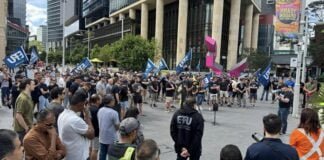It was a historic day. Britain’s biggest strike since 1926 saw the working class march firmly on to centre stage of the political arena, reports UK Socialist Worker
Over two and half million struck. It dealt the biggest blow yet to the government’s attempt to make workers pay for capitalism’s crisis.
Towns and cities across the country saw huge rallies that brought workers together to defy the cuts.
Over half a million marched—including some 10,000 in Dundee, 20,000 in Bristol and 50,000 in London (see pages 4&5 for more).
Picket lines were solid, well attended, and full of good spirit and determination. From gravediggers to chiropodists, the people who keep our essential services going stepped out to fight.
The strike started at the earliest possible moment. Some 50 trade unionists at the Bristol Royal Infirmary welcomed in 30 November by walking out at midnight.
The Homerton ambulance station in London had a roaring brazier early in the morning.
The building was covered in home-made placards and banners. Inside, the workers had their paint pots out, putting the finishing touches to their latest banner.
Kath Jennings, a paramedic at Homerton, told Socialist Worker, “The first shift stopped work at midnight. I wasn’t sure if they would, but this turned out to be a solid 24-hour strike.
“The person that does our tea club has bought so much food, you’d think we were going to be out forever.”
The day was filled with anger, but also good humour. In Manchester over 50 pickets and supporters rallied outside the city’s mental health trust in Chorlton.
The 1 Percent Vampires, a local youth theatre group, performed a play on the picket line. “We are here to suck the blood of the 99 percent,” they declared as they toured the picket line “biting” trade unionists.
At the Institute of Education in central London pickets set up a “bowling for pensions” game, knocking down skittles decorated with the faces of government ministers.
Panicked
A panicked mainstream media didn’t know quite how to react. It spent weeks ignoring or writing off the prospect of strikes.
Then it switched to denunciations of strikers, followed by desperate attempts to downplay the whole day by claiming a low turnout.
But the reality of the picket lines told a different story. At the Manchester Royal Infirmary there were 200 people on 17 picket lines—and that was just that one site.
In every town and city there were tales of solidarity as people came together against a hated Tory-led government.
At Bradford College students brought tea and coffee for their striking lecturers.
“You helped us fight for our Education Maintenance Allowance, so we’ll help you fight for your pensions,” students Piers and Milan told them. “Your fight is our fight.”
It was the same story elsewhere. Jackie Applebee, an east London GP, reported, “Strikers from Central Foundation Girls School, Phoenix School and the Connexions youth service joined forces with supporters from three local GP surgeries.
“About 50 of us took to the road and marched towards Whitechapel. We were joined there by pickets from Queen Mary university.
“We held an impromptu rally at the Royal London hospital then marched through the City to the Occupy London camp at St Paul’s cathedral, then on to the London march.”
The Kirklees Unison office worked late on Tuesday night to process 74 last-minute membership applications.
In the morning, pickets were amused to see scabs stuck outside the main civil building in Huddersfield.
A human resources officer tried to open up for them—but couldn’t deactivate the alarm.
Some trade union traditions were reinstated. In Salford around 50 workers picketed at the Turnpike House refuse depot. Not one bin wagon left the depot.
Milkman
One refuse collector and Unison steward said, “We’ve been prepping for weeks to build the strikes and it’s paid off. We stopped two lots of deliveries—the milkman and the water man.”
In Telford refuse workers at private provider TWS joined Unison so that they could strike and refused to cross picket lines.
Everywhere workers were furious at the government lies about the strike. Luana Avegliano, a PCS member, was on the picket line at Downing Street.
She told Socialist Worker, “I work for the Cabinet Office, so Francis Maude is our minister. Yesterday I gave him a flyer and asked why he’s still peddling lies about our pensions being unaffordable.”
Several chefs were picketing at the House of Commons, including Nick, a member of the GMB union.
“Most of us have worked here over 25 years,” he told Socialist Worker.
“There’s been a really good response. There are only 15 chefs working today out of 80—so MPs will get no food.”
Owen, a teacher in the NASUWT union in Southwark, expressed his anger at the government’s brass neck.
“All these ministers going on television telling lies are really disgusting,” he said. “We need to fight them.”
There was also determination that the strike would not be a one-off. People were insistent that 30 November had to be followed up with more strike days.
“It’s important that this is not the end of the campaign,” said Alison, a council worker from Fife.
“I’ve lost a day’s pay and I don’t mind losing more—as long as we have a real fight and a real chance of winning. There’s no point in only going half way up the hill!”
As Unison member Pól Ó’Ceallaigh put it on the steps of Oxford town hall, “One day is not going to win it—we need effective action again and again.”
Reporting from Socialist Worker UK, the publication of Solidarity’s sister organisation, the UK Socialist Workers’ Party





